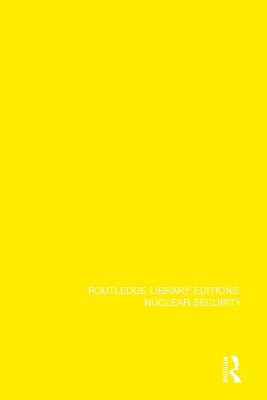
Internationalization to Prevent the Spread of Nuclear Weapons
Routledge (Verlag)
978-0-367-50966-8 (ISBN)
First published in 1980, the original blurb read:
In August – September 1980 the second Review Conference of the Non-Proliferation Treaty (NPT) will take place in Geneva. As this Treaty is the most important barrier to the proliferation of nuclear weapons, the results of the Conference will obviously have major effects in the field of arms control and disarmament.
The implications of the recent International Nuclear Fuel Cycle Evaluation (INFCE) are that the technological capabilities of many countries are such that there is no technical solution to the problem of the spread of nuclear weapons to countries that do not now have them. Thus, it appears that if there is a solution at all, it must be political in nature.
A possible element in such a political solution is the internationalization of the sensitive parts of the nuclear fuel cycle; that is, those parts that have the potential of producing fissile materials to make nuclear weapons. Although the intricacies of a system of internationalization are still unresolved, the concept, if realized, would provide another powerful political barrier to nuclear weapon proliferation – a reinforcement for the aims of the NPT itself.
Against this background, and as a follow-up to its first symposium and the resultant book, Nuclear Energy and Nuclear Weapon Proliferation, SIPRI convened a second international group of experts to continue its discussions of issues pertinent to the forthcoming NPT Review Conference. The meeting took place at SIPRI in Stockholm, 31 October – 2 November 1979, when the feasibility of internationalizing the nuclear fuel cycle was examined.
SIPRI’s views on this complex approach are expressed in Part 1 of this book - Internationalization to Prevent the Spread of Nuclear Weapons. Part 2 contains the papers that were presented at the symposium.
Stockholm International Peace Research Institute SIPRI is an independent international institute dedicated to research into conflict, armaments, arms control and disarmament. Established in 1966, SIPRI provides data, analysis and recommendations, based on open sources, to policymakers, researchers, media and the interested public. Based in Stockholm, SIPRI is regularly ranked among the most respected think tanks worldwide.
Preface. Energy Units. Glossary. Abstracts. Part 1: Internationalization to Prevent the Spread of Nuclear Weapons. Part 2 Paper 1. Considerations on the Technical Outcome of INFCE U. Farinelli. Paper 2. Background Data Relating to the Management of Nuclear Fuel Cycle Materials and Plants J. Rotblat. Paper 3. Nuclear Fuel Cycle Internationalization: The Uncertain Political Content G. I. Rochlin. Paper 4. An International Plutonium Policy A. R. W. Wilson. Paper 5. Internationalization of the Nuclear Fuel Cycle B. Sanders. Paper 6. A New International Consensus in the Field of Nuclear Energy for Peaceful Purposes A. J. Meerburg. Paper 7. Some Factors Affecting Prospects for Internationalization of the Nuclear Fuel Cycle W. H. Donnelly. Paper 8. International Plutonium Policies: A Non-Proliferation Framework D. W. Campbell and M. J. Moher. Paper 9. Export of Nuclear Materials R. W. Fox. Paper 10. The Role of Institutional Measures in Strengthening the Non-Proliferation Regime S. Lodgaard. Paper 11. Energy Independence via Nuclear Power with Minimized Weapon-Proliferation Risks K. Hannerz. Paper 12. A Nuclear Fuel Cycle Pool or Bank? M. Osredkar. Paper 13. An International Fuel Bank D. L. Siazon, Jr. Paper 14. International Plutonium Storage M. L. James. Paper 15. Institutional Solutions to the Proliferation Risks of Plutonium J. Lind. Paper 16. International Storage of Spent Reactor Fuel Elements B. Gustafsson. Paper 17. Spent Fuel Storage G. I. Rochlin. Paper 18. Regional Planning of the Nuclear Fuel Cycle: The Issues and Prospects B. W. Lee. Paper 19. Multinational Arrangements for Enrichment and Reprocessing I. Smart. Paper 20. Sanctions as an Aspect of International Nuclear Fuel Cycles P. Szasz. Paper 21. Internationalizing the Fuel Cycle: The Potential Role of International Organizations K. H. Larson. Index.
| Erscheinungsdatum | 20.11.2020 |
|---|---|
| Reihe/Serie | Routledge Library Editions: Nuclear Security |
| Verlagsort | London |
| Sprache | englisch |
| Maße | 156 x 234 mm |
| Gewicht | 630 g |
| Themenwelt | Sozialwissenschaften ► Politik / Verwaltung ► Europäische / Internationale Politik |
| ISBN-10 | 0-367-50966-0 / 0367509660 |
| ISBN-13 | 978-0-367-50966-8 / 9780367509668 |
| Zustand | Neuware |
| Haben Sie eine Frage zum Produkt? |
aus dem Bereich


